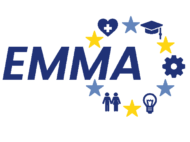Why Quality Assurance is needed in a project?
A successful and ambitious process most often needs to be reflected and monitored on regular basis. EMMA consortium is creating something very new and innovative. The development of the European master on healthy and active ageing creates common practices and shared conceptual knowledge, and the on-line master programme provides resource-wise and easily applicable education model that also fosters accessibility and internationalisation. This kind of master programme has not been developed before nor is offered by other European HEIs. To help us to stay on track and proceed in the right direction, the work is supported with a coherent and systematically implemented quality assurance (QA) process.
How to do it then?
The QA process is holistic and participatory. We organize reflective QA workshops every May and conduct semi-structure interviews with focus groups from each partner one by one. The results are then reported back to the coordination team and whole consortium. The key questions of the QA process are: What have we achieved so far? How do we perform ourselves? What needs to be modified to ensure future proceedings? How do the results change the context and practitioners? What is the long-term impact of EMMA? These questions split into detailed discussion points are elaborated together three times during the project, always at the end of the academic year to look both back and to the future. We do reflections over the current state, identify the gaps and potential, estimate the future proceedings and results. Further, we agree on corrective actions and support for the next academic year actions to ensure we reach our ambitious aims.
Here are the results
The first QA round showed us that we believe we are progressing fast, proceeding as planned without major difficulties and despite working only online. We also identify ourselves as a good team and equal partners. A lot was done in one year, we believe. Productive meetings, full attendance and good online cooperation helped us reached our aims. Partners have joined their effort on almost completing the tasks planned for intellection output (IO) 1 and 2, while there was some preliminary work done also for other IO’s.
We managed to nearly finish the first output data collection and analyses, scoping review, while all partners got Ethics committee’s approval for sending out the survey. We also collected good teaching practices and gathered curriculum framework information. The project coordinator has supported the work as planned, we believe.
We have spread the word about the EMMA project and got positive feedback. QA also highlighted that even though our roles are getting clearer, the roles of coordinators and co-coordinators still need some clarification.
All partners in the EMMA project are satisfied with internal structure, organisation, and work allocation, are committed to proceeding and enjoy the support from their colleagues. We also noticed how we started to open up as individuals.
But as any other good QA, we identified some space for improvement. We should aim to find more suitable time for meetings which works for all partners, work on trying to reach a final decision on our meetings, perhaps have shorter ones and try to do more over the e-mail. Meetings regarding more IO’s are beneficial, as they are often interlinked, we believe. As a team, we need more mutual understanding that not all have the same time allocated for the EMMA project, and should strive to communicate more openly, clearly, express our expectations and action points. We should also make sure to make this experience more enjoyable, take more time, try to exceed out time on this project as little as possible, and maybe try working in smaller groups. Explore ways to include other colleagues and students more is another thing we should aim for.
A note on working in Covid-19 times. We all agree that it would be wonderful to meet in person or at least get to know each other more. Working online is really demanding and it might take more time than working face to face, which is also a learning experience for us all and a thing to consider with our master’s degree program.
And what now?
EMMA QA follows the principles on Deming’s cycle including the four PDCA (plan, do, check and act) steps. The process is iterative and participatory promoting continuous improvement of our performance and actions based on collective analyses and reporting. Based on the first QA round results, we have already modified our meeting and communication practices and timetables. We have also clarified the working roles of coordinators, co-coordinators and other partners in output development. The journey continues and learn from each other and the process.
Writers:
Dr. Liisa Timonen
Head of International Affairs, Karelia University of Applied Sciences
International RDI, Partnerships and Global Education
Benjamin Penič
Research Assistant, Faculty of Social Work, University of Ljubljana


